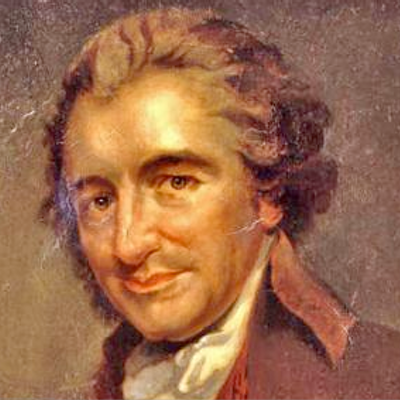Hero #099: Thomas Paine … (02/24/16)
Thomas Paine was an English-born American political activist, philosopher, political theorist, and revolutionary. Considered to be one of the Founding Fathers of the United States, Paine authored the two most influential pamphlets at the start of the American Revolution, and was a primary source of inspiration for the rebels in 1776 to declare independence from Great Britain. His ideas reflected the higher ideals of justice, equality, freedom, and transnational human rights.
Born in Thetford in the English county of Norfolk, Paine migrated to the British American colonies in 1774 with the help of Benjamin Franklin, arriving just in time to participate in the American Revolution. Virtually every rebel read (or listened to a reading of) his powerful pamphlet Common Sense (1776), a writing which crystallized the rebellious demand for independence from Great Britain. Indeed, Common Sense was so influential that John Adams openly stated, “Without the pen of the author of Common Sense, the sword of Washington would have been raised in vain.” One distinctive idea in Common Sense was the reflection of Paine’s beliefs regarding the peaceful nature of republics; an early and strong conception of what scholars would come to call “ democratic peace theory” … He also propagated other highly profound ideas, among them, a) that ordinary people can indeed make sound judgments on major political issues, b) that there exists a body of popular wisdom that is readily apparent to anyone, c) that common sense could be used to refute the claims of traditional institutions. These ideals empowered the common man and became powerful weapons people used to delegitimize monarchy and overturn prevailing social structures – in essence, paving the way for the potential blossoming of democracy.
And yet Paine persisted in being a radical voice in Britain even after the Revolution. In 1792, issued his Rights of Man, Part the Second, Combining Principle and Practice, in which he suggested a representative government with enumerated social programs to remedy the intense poverty of commoners. Radically reduced in price to ensure unprecedented circulation, this pamphlet was sensational in its impact and gave birth to numerous reform societies. An indictment against Paine for seditious libel followed its publication, and government agents followed Paine wherever he went and instigated mobs, hate meetings, and burnings in effigy. Undaunted by these oppressions, a fierce pamphlet war resulted, in which Paine was defended and assailed in dozens of other works. The authorities ultimately chased Paine out of Great Britain, tried him in absentia, and found him guilty. That summer, he answered the sedition and libel charges thus: “If, to expose the fraud and imposition of monarchy … to promote universal peace, civilization, and commerce, and to break the chains of political superstition, and raise degraded man to his proper rank; if these things be libelous … then let the name of ‘libeler’ be engraved on my tomb.”
In December of 1793, Paine was arrested and was taken to Luxembourg Prison in Paris. While in prison, he continued to work on his masterpiece The Age of Reason (1793–94). James Monroe used his diplomatic connections to get Paine released in November 1794, whereafter The Age of Reason – which championed deism (the belief that the Divine is infused in everything, and directly witnessable within the grandeur of Nature), promoted reason, encouraged free thought, and argued against institutionalized religion (the Christianity of his day in particular) — again made him notorious, and he was ostracized for his intellectual & moral courage (even in the United States after his return there in 1802) until his death in 1809.
“All national institutions of churches, whether Jewish, Christian or Turkish, appear to me no other than human inventions, set up to terrify and enslave mankind, and monopolize power and profit. Whenever we read the obscene stories, the voluptuous debaucheries, the cruel and tortuous executions, the unrelenting vindictiveness with which more than half the Bible is filled, it would be more consistent that we call it the word of a demon than the word of God. It is a history of wickedness that has served to corrupt and brutalize mankind; and, for my part, I sincerely detest it, as I detest everything that is cruel.” ~ Thomas Paine
“Thomas Paine had passed the legendary limit of life. One by one most of his old friends and acquaintances had deserted him. Maligned on every side, execrated, shunned and abhorred – his virtues denounced as vices – his services forgotten – his character blackened, he preserved the poise and balance of his soul. He was a victim of the people, but his convictions remained unshaken. He was still a soldier in the army of freedom, and still tried to enlighten and civilize those who were impatiently waiting for his death. Even those who loved their enemies hated him, their friend – the friend of the whole world – with all their hearts. On the 8th of June 1809, death came – Death, almost his only friend. At his funeral no pomp, no pageantry, no civic procession, no military display. In a carriage, a woman and her son who had lived on the bounty of the dead – on horseback, a Quaker, the humanity of whose heart dominated the creed of his head – and, following on foot, two Negroes filled with gratitude – constituted the funeral cortege of Thomas Paine.” ~ Robert Ingersoll





 ;
;